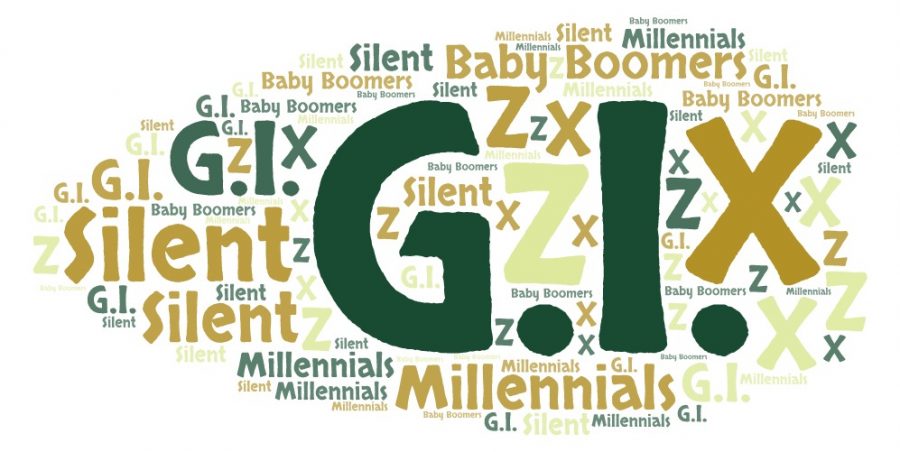Generations A to Z
October 8, 2019
“In my generation, we didn’t have cell phones.” How many times have you heard a person, whether older or younger, talk about their generation? Have you ever stopped to wonder what generation you are a part of, how generations got their official names, or how the idea of naming generations came about? According to ThoughtCo., the naming of generations began in the 20th century. Gertrude Stein, an American novelist, poet, playwright, and art collector, was considered the first to do so. She assigned the name of the “Lost Generation” on those who had been born around the turn of the century and served during World War I. The site also explains that Neil Howe and William Strauss, generational theorists, are credited with identifying and naming the 20th-century generations in the U.S. with their 1991 study “Generations.”
In this study they identified people born in the 1900s to 1920s as the G.I. Generation. However, Tom Brokaw later published The Greatest Generation, a best-selling cultural history of the Great Depression and World War II, and that name stuck. According to ThoughtCo., Canadian author Douglas Coupland, born in 1961 at the tail end of the Baby Boom, is credited with naming the generation that followed him.
Coupland’s 1991 book, Generation X: Tales for an Accelerated Culture, and later works chronicled the lives of 20-somethings and came to be seen by some as defining that era’s young. ThoughtCo. also says how the naming of the generations that followed Generation X is less clear. In the early 1990s, the children following Generation X were referred to as Generation Y by media outlets like Advertising Age, which is credited with first using the term in 1993. However, by the mid-’90s, this generation was more often referred to as Millennials. The name for the most recent generation varies even more. Some prefer Generation Z, continuing the alphabetical trend begun with Generation X, while others prefer buzzier titles like Centennials or the iGeneration.
The names of generations vary depending on the sources, but below are the names of generations from the last century up until now, according to CNN.
The Greatest Generation or G.I. Generation (born in 1924 or earlier): If you were born in this generation you just missed your chance to serve in World War I, but you probably experienced the Great Depression or World War II. According to O’Reilly, the G.I. Generation was very patriotic and “strong supporters of the American way.”
The Silent Generation (born 1925-1945, sometimes listed as 1925-1942): According to study.com, the theory for why this generation is called the Silent Generation is that the children who grew up in this time worked hard and kept quiet. It was commonly understood that children should not be seen or heard. In 1951, a Time magazine article described the children of the generation as unimaginative, withdrawn, unadventurous, and cautious. Time magazine used the name “Silent Generation” to refer to these individuals. The name has been there ever since.
Baby Boomers (born 1946-1964, sometimes listed as 1943-1964): According to seniorliving.org, people born in this generation experienced great social and political upheaval. This generation experienced race riots, the civil rights movement, Vietnam War protests, the assassinations of John F. Kennedy, Martin Luther King Jr., and Robert F. Kennedy, the man on the moon, free love, and drug experimentation.
Generation X (born 1965-1980, sometimes listed as 1965-1979): This generation was seen as more ethnically diverse and better educated than their preceding generations. According to thebalancecareers.com, this generation was seen as flexible, technologically adept, and individualistic.
Millennials (born 1981-1996, sometimes listed as 1980-2000): Millennials are described as lazy, narcissistic, and prone to jump from job to job.
Generation Z or Gen Z (sometimes called post-millenials, born in 1997- today): Lastly, there is Gen Z. This generation experienced the mass increase in technology and social media usage. We are unfortunately prone to use our smart phones constantly, according to visioncritical.com, and prefer purchasing products over having exciting experiences. Visioncritical.com also said we are entrepreneurial, tech-savvy, respond to edgy campaigns, and want to co-create culture.

















































































































































